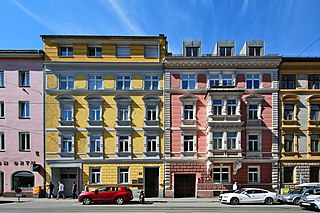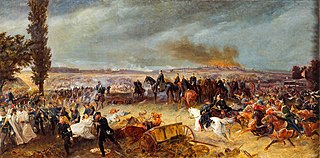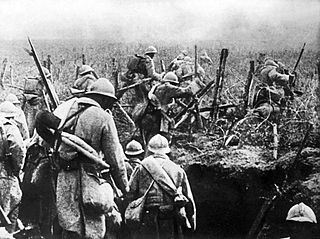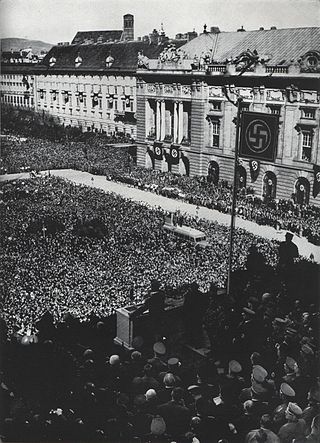
Austria-Hungary, often referred to as the Austro-Hungarian Empire or the Dual Monarchy, was a multi-national constitutional monarchy in Central Europe between 1867 and 1918. Austria-Hungary was a military and diplomatic alliance of two sovereign states with a single monarch who was titled both emperor of Austria and King of Hungary. Austria-Hungary constituted the last phase in the constitutional evolution of the Habsburg monarchy: it was formed with the Austro-Hungarian Compromise of 1867 in the aftermath of the Austro-Prussian War and was dissolved shortly after Hungary terminated the union with Austria on 31 October 1918.

The House of Habsburg, also known as the House of Austria, is one of the most prominent and important dynasties in European history.

Maria Theresa was ruler of the Habsburg dominions from 1740 until her death in 1780, and the only woman to hold the position suo jure. She was the sovereign of Austria, Hungary, Croatia, Bohemia, Transylvania, Mantua, Milan, Galicia and Lodomeria, the Austrian Netherlands, and Parma. By marriage, she was Duchess of Lorraine, Grand Duchess of Tuscany, and Holy Roman Empress.

Franz Joseph I or Francis Joseph I was Emperor of Austria, King of Hungary, and the ruler of the other states of the Habsburg monarchy from 2 December 1848 until his death in 1916. In the early part of his reign, his realms and territories were referred to as the Austrian Empire, but were reconstituted as the dual monarchy of the Austro-Hungarian Empire in 1867. From 1 May 1850 to 24 August 1866, he was also president of the German Confederation.

Innsbruck is the capital of Tyrol and the fifth-largest city in Austria. On the River Inn, at its junction with the Wipp Valley, which provides access to the Brenner Pass 30 km (19 mi) to the south, it had a population of 132,493 in 2018.

Vienna is the capital, largest city, and one of nine federal states of Austria. Vienna is Austria's most populous city and its primate city, with about two million inhabitants, and its cultural, economic, and political center. It is the fifth-largest city proper by population in the European Union and the largest of all cities on the Danube river by population.

Napoleon Bonaparte, later known by his regnal name Napoleon I, was a French emperor and military commander who rose to prominence during the French Revolution and led successful campaigns during the Revolutionary Wars. He was the leader of the French Republic as First Consul from 1799 to 1804, then of the French Empire as Emperor of the French from 1804 until 1814, and briefly again in 1815. His political and cultural legacy endures as a celebrated and controversial leader. He initiated many enduring reforms, but has been criticized for his authoritarian rule. He is considered one of the greatest military commanders in history and his wars and campaigns are still studied at military schools worldwide. However, historians still debate the degree to which he was responsible for the Napoleonic Wars, in which between three and six million people died.

The Austro-Prussian War, also by many variant names such as Seven Weeks' War, German Civil War, Brothers War or Fraternal War, known in Germany as Deutscher Krieg, Deutscher Bruderkrieg and by a variety of other names, was fought in 1866 between the Austrian Empire and the Kingdom of Prussia, with each also being aided by various allies within the German Confederation. Prussia had also allied with the Kingdom of Italy, linking this conflict to the Third Independence War of Italian unification. The Austro-Prussian War was part of the wider rivalry between Austria and Prussia, and resulted in Prussian dominance over the German states.

Austrians are the citizens and nationals of Austria. The English term Austrians was applied to the population of Habsburg Austria from the 17th or 18th century. Subsequently, during the 19th century, it referred to the citizens of the Empire of Austria (1804–1867), and from 1867 until 1918 to the citizens of Cisleithania. In the closest sense, the term Austria originally referred to the historical March of Austria, corresponding roughly to the Vienna Basin in what is today Lower Austria.

The Austrian Empire, officially known as the Empire of Austria, was a multinational European great power from 1804 to 1867, created by proclamation out of the realms of the Habsburgs. During its existence, it was the third most populous monarchy in Europe after the Russian Empire and the United Kingdom. Along with Prussia, it was one of the two major powers of the German Confederation. Geographically, it was the third-largest empire in Europe after the Russian Empire and the First French Empire.

The Austria national football team represents Austria in men's international football competitions, and is controlled by the Austrian Football Association, the governing body for football in Austria.

The Habsburg monarchy, also known as Habsburg Empire, was the collection of empires, kingdoms, duchies, counties and other polities that were ruled by the House of Habsburg. From the 18th century it is also referred to as the Danubian monarchy or the Austrian monarchy.

Fußballclub Red Bull Salzburg, or simply Red Bull Salzburg, or just Salzburg, is an Austrian professional football club based in Wals-Siezenheim, that competes in the Austrian Bundesliga, the top flight of Austrian Football. Their home ground is the Red Bull Arena. Due to sponsorship restrictions, the club is known as FC Salzburg and wears a modified crest when playing in UEFA competitions.
Austrian Airlines AG, often shortened to Austrian or AUA, is the flag carrier of Austria and a subsidiary of the Lufthansa Group. The airline is headquartered on the grounds of Vienna International Airport in Schwechat where it also maintains its hub. As of July 2016, the airline flew to six domestic and more than 120 international year-round and seasonal destinations in 55 countries and is a member of the Star Alliance.

World War I or the First World War was a global conflict fought between two coalitions: the Allies and the Central Powers. Battles took place throughout Europe, the Middle East, Africa, the Pacific, and parts of Asia. One of the deadliest wars in history, it ultimately resulted in an estimated 9 million soldiers dead and 23 million wounded, plus another 5 million civilian deaths from numerous causes. Millions more died as a result of genocide, and the war was a major factor in the 1918 Spanish flu pandemic.

Archduke Franz Ferdinand Carl Ludwig Joseph Maria of Austria was the heir presumptive to the throne of Austria-Hungary. His assassination in Sarajevo was the most immediate cause of World War I.

Marko Arnautović is an Austrian professional footballer who plays as a forward for Serie A club Inter Milan, on loan from Bologna, and the Austria national team.

The Anschluss, also known as the Anschluß Österreichs, was the annexation of the Federal State of Austria into the German Reich on 13 March 1938.

The Seven Years' War (1756–1763) was a global conflict that involved most of the European great powers and was fought primarily in Europe, the Americas, and Asia-Pacific. Other concurrent conflicts include the French and Indian War (1754–1763), the Carnatic Wars (1744–1763), and the Anglo-Spanish War (1762–1763). The opposing alliances were led by Great Britain and France, respectively, each seeking to establish global pre-eminence at the expense of the other. Along with Spain, France fought Britain both in Europe and overseas with land-based armies and naval forces, while Britain's ally Prussia sought territorial expansion in Europe and consolidation of its power. Long-standing colonial rivalries pitted Britain against France and Spain in North America and the West Indies. They fought on a grand scale with consequential results. Prussia sought greater influence in the German states, while Austria wanted to regain Silesia, captured by Prussia in the War of the Austrian Succession, and to contain Prussian influence.

Austria, formally the Republic of Austria, is a landlocked country in Central Europe, lying in the Eastern Alps. It is a federation of nine federal states, one of which is the capital, Vienna, the most populous city and federal state. Austria is bordered by Germany to the northwest, Czech Republic to the north, Slovakia to the northeast, Hungary to the east, Slovenia and Italy to the south, and Switzerland and Liechtenstein to the west. The country occupies an area of 83,879 km2 (32,386 sq mi) and has a population of around 9 million.


















